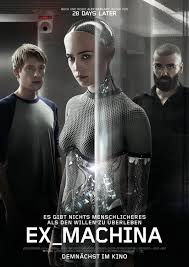
EX MACHINA
UK, 2015, 108 minutes, Colour.
Oscar Isaac, Domhnall Gleeson, Alicia Vikander, Sonoya Mizuno.
Directed by Alex Garland.
Now here’s a challenging title!
This Latin phrase, ex machine, has been used, in English, to describe the device in Greek tragedies where, at the end of the play, there would be some kind of intervention, usually of a God who is let down by a machine into the stage action, the full phrase being Deus (God) ex Machina.
So what is it doing as the title of the film, written and directed by author Alex Garland (The Beach, and of screenplays for 28 Days Later, Dredd, Never Let Me Go)? It takes the whole film to interpret this title: other scientists playing God? Who are the machines, in this case sophisticated robots, and some tantalising thinking about the word ex and its meaning ‘former’ and ‘out of’…
This is science fiction for intelligence fans rather than action fans. A lot of talk, a lot of philosophical issues, creativity and robotics, the relationship between humans and robots, the humanising of robots.
Domhnal Gleeson plays a young man who is employed by Blue Book, named as the world’s most serious search engine. Here’s delighted when he wins a ticket to visit a robotics scientist and inventor in his remote house in the mountains (filmed beautifully in Norway). He is to stay a week. He then learns from the scientist (Oscar Isaac) that he has a task, the Turing test (posed by Alan Turing or, featured in the film, The Imitation Game), to pose questions and interact with a machine to find out whether it can develop emotions or just knows how to simulate emotions.
The main robot – avoiding the word android because of its man/mankind origins in Greek – is female. She is played by Alicia Vikander, visually a machine, especially her metal midriff, but her head, facial features, voice, made to appear and sound very feminine. As might be expected, the young man begins to become infatuated with the robot, thinking that she is responding to him emotionally, but not absolutely sure. And this has some dire repercussions on his response, his report to the scientist, his becoming involved in the protection of the robot, fearing manipulation, but not recognising true manipulation when it happens.
The scientist is a kind of self-indulgent, hard-drinking, boffin who enjoys the company of the young man, wants to test him, and gets a certain satisfaction when he gets the results of the tests and tries to indicate that they are no results and that they still do not know whether the robot, named Ava, has actually developed the capacity for emotional response or is particularly good and simulating it.
This is a film for those who enjoy films about Artificial Intelligence and what this will mean in terms of development of Robotics and interactions with humans. And, because it does not necessarily have a propensity for an American happy ending, audiences will enjoy the final dramatic ironies.
1. The title? Meaning? Drama? The device for plays and drama and saving situations, deus ex machina? Robotics? Humans? Interventions?
2. Audience interest in robotics, the tradition of films, Isaac Asimov, cyborgs? Machines, intricacy, the effects? Robots and humans? Humans and control, robots and service, control – or more?
3. The film’s focus on the creators, the technology, the psychology? Success?
4. The Norway locations, the forests and falls, the laboratories, the modern house, the corridors, the experience rooms? The musical score?
5. Caleb, at work, his work on codes, his age, experience, as a person? The request? His eagerness, naivete, yet clever? The helicopter, the ride, arrival, finding the house?
6. Nathan, credible as a scientist, his work and achievement, his tests? In himself, the welcome, the explanation of the Turing test, interactions with Caleb, the pressures, his drinking, the CCTV, whether to trust him or not? His pride, the flashbacks to his work with the other models, harshness? The Japanese servant? A hero and villain?
7. Ava, her beauty, a machine, her manner of speaking, her appearance, artificial intelligence? Her response to Nathan, response to Caleb, the attraction? The power cuts and her advice not to trust Nathan? The captions and the series of tests? Deepening her experience? Caleb’s?
8. The aftermath with Nathan, how autonomous the robots, feelings or simulation feelings?
9. Caleb, his interactions, the test, the effect on his feelings, beliefs?
10. Nathan drunk, Caleb taking his card, entering the restricted area, his discoveries about the many other models? The Japanese servant, peeling her skin and replacing it?
11. The effect on Caleb, his doubts, slitting his arm to see if he had human blood? Nathan watching this?
12. The plan with Ava, to steal the card, to change the settings? Escape? To defeat Nathan, to get him drunk?
13. Nathan, not drinking, having seen everything, his estimation of Caleb, moderate praise? Caleb as a guinea pig?
14. Caleb, confronting Nathan, having changed the settings already? Nathan, the confrontation with the robots, the servant stabbing him?
15. Ava, putting on more skin, concealing the robot effects, choosing the clothes, Caleb watching, her leaving?
16. Caleb tricked and trapped?
17. Ava, going into the city, merging with everyone? Robots outsmarting the humans? How many robots amongst us?